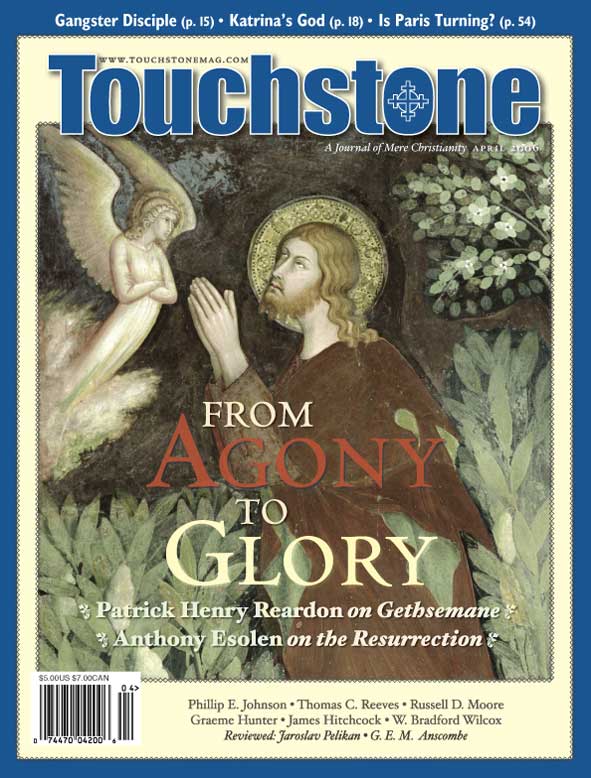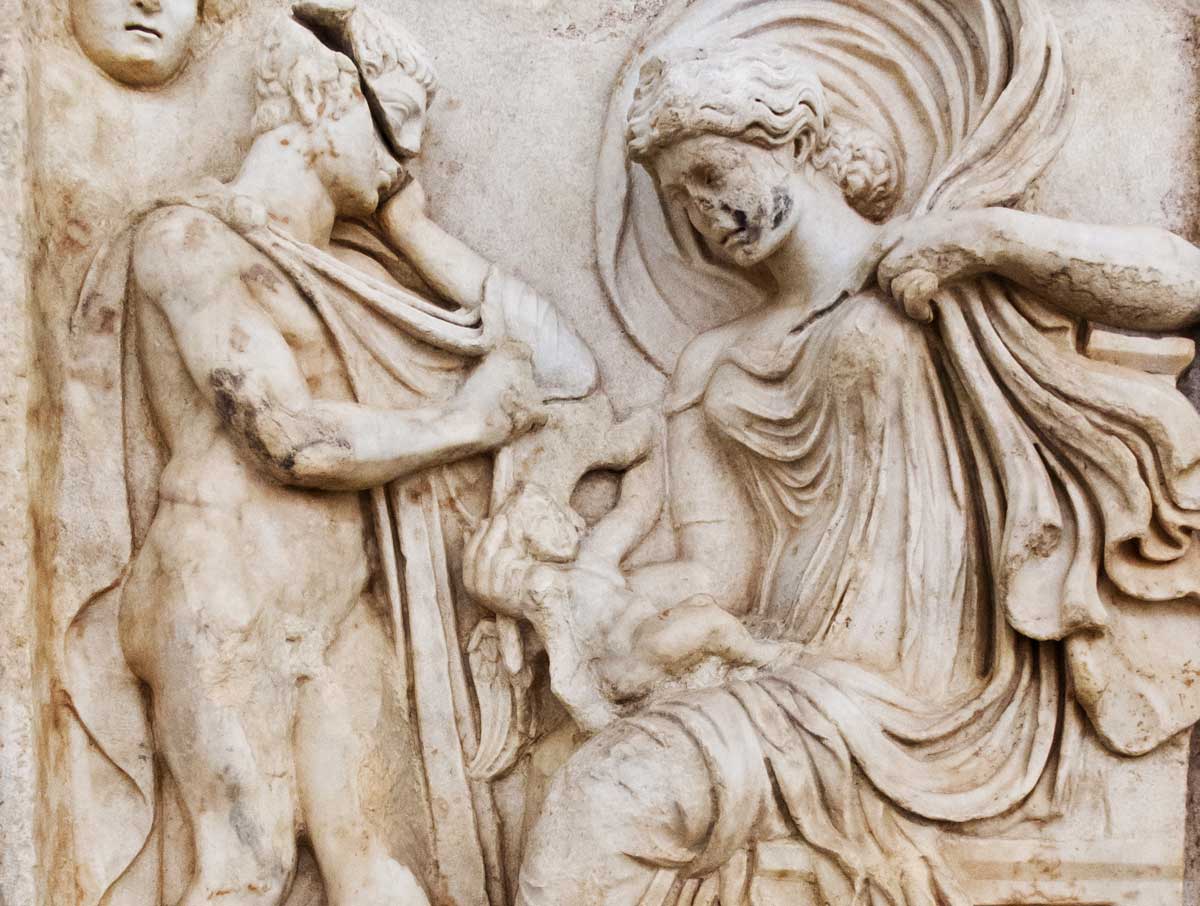Gangster Disciple
Preston Jones on the Lesson I Remembered About the Gospel
At fifteen I found myself in the home of a gangster, probably a member of the L.A. Crips. This is what the week’s visitation program at my Baptist church in southern California had called me to. The Cripster’s house was a long way from the church, and I doubted that he had ever been there. I have no idea how the connection was made.
But as the church’s youth pastor and I went inside, I found myself moving alone toward a couch across a tiny living room from the thug and his girlfriend. I lived in a tough neighborhood. They lived in San Bernardino’s toughest neighborhood. According to lore, a teenager had been murdered nearby with a pickaxe a few days earlier, and it had taken the cops an hour to get there.
There must have been some small talk. I probably began to talk “black,” the language of my own neighborhood. I don’t think he said one word. Then I came to the point: Did he want to hear about Jesus? He nodded his head slightly, once.
The House Heard
I began with Adam and his sin, related some facts about the insufficiency of the blood of goats and bulls and of the need for a perfect sacrifice, moved to the death and rising again of the Lamb, and then to the promise of forgiveness and eternal life. “Do you want to ask Jesus into your heart?” I asked. He nodded.
So I led him in a version of the “sinner’s prayer,” which included the essential components: admit that you’re a sinner and in need of a savior; ask Jesus to be your savior. Simple.
Upon the “amen” I looked up, and he was staring at me with the same look as before—a look of indifference and boredom spurred by a third-grade reading ability. This wasn’t how things were supposed to be. After reciting the sinner’s prayer, a person cried, or at least smiled. His sins had been washed away! He was destined for heaven! But his expression was the same as before.
There was a brief, uneasy silence, and then I changed the subject. “Did you hear about the guy who stole a bag of weed from a dealer?” More recent lore. The gangster put his hand into his coat, indicating that he had a gun, and that he knew the drug dealer, and that I might be in trouble. “I don’t know the guy,” I said. “I just heard about it.” The hand on the gun relaxed. And I don’t remember what happened between then and my youth pastor’s appearance minutes later.
As we walked to the car, the pastor told me that the woman he had been talking to—the gangster’s mom? aunt? sister?—had accepted Jesus. And I distinctly remember the glow on his face as he said, “This house has heard the gospel!”
If I felt unease when he said that, I don’t remember it. And, anyway, if I did, the feeling was soon submerged in evangelistic fervor. In those days I tried never to let a day pass without telling someone about Jesus.
I never saw the guy, his girlfriend, or the other woman again.
The Gangster’s Gospel
After years of not thinking about it, the evening in that house came into my mind and rattled around, and I wondered if that house really had heard the gospel. And if the house had heard the gospel, is it the same gospel I’d want my daughter to hear?
Then I wondered why a gangster in southern California, circa 1984, would care about the sins of Adam and the blood sacrifice of mammals. Why would he care about a white boy dying on a cross 2,000 years ago? What did that have to do with the kid who got killed with a pickaxe, and the cops who were an hour late, and the pot dealer who got ripped off, and that prison of a neighborhood and its hellish “schools”?
Had he heard the gospel? The question swam around in my mind as I watched a documentary on the Reagan presidency, as I brushed my teeth. It slipped in and out of my dreams. It rambled in my head as I did my morning Bible reading in French, Welsh, and Latin.
It remained there as I contemplated how far I had come since that night: the kid who was socially promoted through high school, who spoke only slang, now reads the Bible in multiple languages.
And soon that question was replaced by another: Had that night in that house given God something to work with? In quick succession I thought of the man who made a manger available and, in doing so, gave God something to work with. I thought of the widow and her penny. I thought of John the Baptist eating locusts and honey. I thought of Joseph of Arimathea and his tomb, of Nicodemus and his myrrh and aloes. I thought of the witless Roman soldier and his ear, and the disciple fleeing naked. Of such is the drama of the gospel.
I see myself sitting there in that guy’s house, rattling off my evangelistic spiel, and I feel that I should be embarrassed—that I should shake my head, as is fashionable among professors at Christian colleges (I teach at one), at the stupidity of the fundamentalist masses. But is God so weak? Could he not use the well-meaning, if still sorry, efforts of a fifteen-year-old who wanted to talk about Jesus?
And then I thought about how long it had been since I had told anyone about Jesus. I thought about the fact that I rarely say the name Jesus anymore, except during the liturgy. I talk to Jesus all the time. I ask him to help others. But I never talk about him.
The misguided fundamentalist kid I used to be liked to talk about Jesus. He put himself at risk passing out tracts to drug dealers and preaching to motorcycle gangsters. He cared about people so much he wanted to tell them about Jesus. He gave away half of what he earned at low-paying jobs. He was reckless for Jesus.
So what began as a reflection on shallow youthfulness ended with the recognition of loss.
A Stumbling-Stone
This morning I was reading Pascal, the mathematician and philosopher who, with no concern for grammar, wrote in his pensées: “God of Abraham, God of Isaac, God of Jacob. not of philosophers and scholars.” And quoted Scripture: “Jesus Christ is a stumbling-stone.”
For a decade now, Evangelicals like me, who have accumulated college degrees and have supposedly cerebral jobs, have been wringing their hands about the intellectual emptiness of the churches they grew up in. Surely there is some justice in this. To not use the mind is to affront the mind’s maker. But within the same movement there has been a desire to make Jesus something other than a stumbling-stone. Jesus should not embarrass us. He should not make us uncomfortable. He should adhere to the rules of logic. Jesus should be nice.
But Jesus uses the impetuous, like Peter. Like a fifteen-year-old evangelist. He uses radio preachers. He uses hypocrites and losers. He uses Catholics and Orthodox and fundamentalists—even Episcopalians. He is nice and not nice. He lifts up and embarrasses. He comforts and discomfits. His logic doesn’t hold: To live, die. To be wealthy, give away. To be smart, become a fool.
Preston Jones teaches history at John Brown University.
subscription options
Order
Print/Online Subscription

Get six issues (one year) of Touchstone PLUS full online access including pdf downloads for only $39.95. That's only $3.34 per month!
Order
Online Only
Subscription

Get a one-year full-access subscription to the Touchstone online archives for only $19.95. That's only $1.66 per month!
bulk subscriptions
Order Touchstone subscriptions in bulk and save $10 per sub! Each subscription includes 6 issues of Touchstone plus full online access to touchstonemag.com—including archives, videos, and pdf downloads of recent issues for only $29.95 each! Great for churches or study groups.
Transactions will be processed on a secure server.
more from the online archives
calling all readers
Please Donate
"There are magazines worth reading but few worth saving . . . Touchstone is just such a magazine."
—Alice von Hildebrand
"Here we do not concede one square millimeter of territory to falsehood, folly, contemporary sentimentality, or fashion. We speak the truth, and let God be our judge. . . . Touchstone is the one committedly Christian conservative journal."
—Anthony Esolen, Touchstone senior editor









